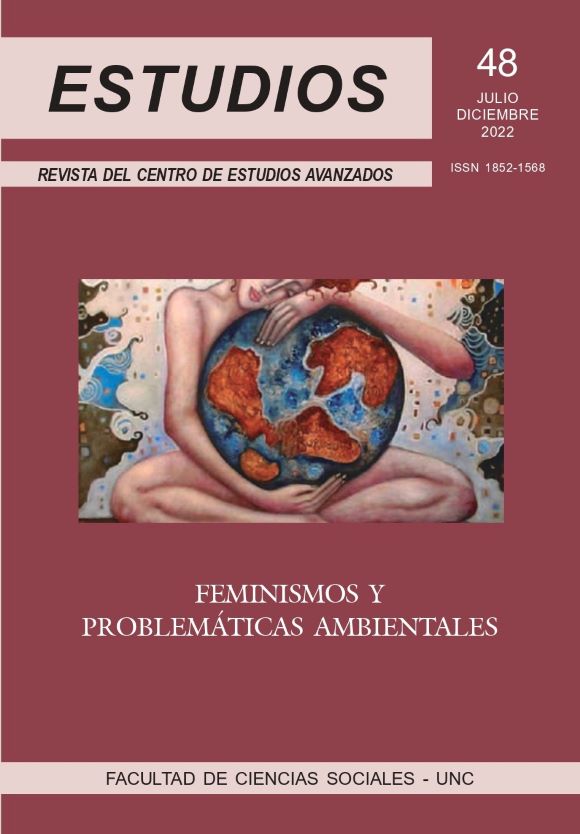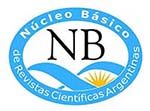Think we must. Some environmental themes in Donna Haraway
DOI:
https://doi.org/10.31050/re.vi48.38363Abstract
To undertake the task of writing some lines referring to feminisms and environmental issues means talking about conceptual weavings that, from my point of view, are at the forefront of thought in this 21st century. The set of voices (as a metonymic figure) that belong to the subjects who speak and think from these perspectives allows us to visualise snapshots of the critical thought installed in this present of unrest. Although nowadays there is a consensus that certain explanations fall short of their purpose if they do not cross disciplinary boundaries (we talk a lot about inter- and trans-disciplines), there are very few that point out the correspondences with a field that has long been recognised as environmental or ecological problems. Hence the radical nature of Haraway's gesture, whose point of view is rooted in this "compost" that hints at a way of doing theory. This idea of mixing, and of systemic, biological and emotional interdependence is today a provocative gesture; proposed as an epistemological orientation, it provides with a reflection that hinges on creative thinking, and that can perhaps account for the complex situations of contemporary life.
Downloads
References
Arendt, H. (1993). La condición Humana. Barcelona: Paidós.
Braidotti, R. (2000). Sujetos nómades. Buenos Aires: Paidós.
Cavarero, A. (2009). Horrorismo. Nombrando la Violencia Contemporánea. México: Anthropos.
De Peretti, C. (2004). Jacques Derrida. Un filósofo tentador. En Segarra, M. (ed.) Lengua por venir / Langue à venir. Seminario de
Barcelona (pp. 9-22). Barcelona: Icaria editorial.
Fernández de Bobadilla, V. (2017). Antropoceno, camino a una nueva era geológica. Alfa, (32), 42-49. Recuperado de https://www.csn.es/documents/10182/13557/Alfa+32
Haraway, D. (1995). Ciencia, Cyborgs y Mujeres. La reinvención de la naturaleza. Madrid: Ediciones Cátedra.
Haraway, D. (1999). Las promesas de los monstruos. Política y sociedad 30, 121-163. Recuperado de https://revistas.ucm.es/index.php/POSO/article/view/POSO9999130121A/24872
Haraway, D. (2019). Seguir con el problema. Bilbao: Consonni.
Lubertino, M.J. (2021). Ambiente. En: Gamba, S.; Diz, T. (Ed.) (2021). Nuevo diccionario de estudios de género y feminismos. Buenos Aires: Biblos.
Maldonado Zapletal, A. (2021). Ecofeminismos. En: Gamba, S.; Diz, T. (Ed.) (2021). Nuevo diccionario de estudios de género y feminismos. Buenos Aires: Biblos.
Martin, G. (2019). Mujeres, Ambiente y Territorio en América Latina. (Tesis Doctoral). Universidad Nacional de Río Cuarto, Río Cuarto.
Olivera, M. (2019). Feminismo popular y revolución: entre la militancia y la antropología. Ciudad Autónoma de Buenos Aires: CLACSO.
Puleo, A. (Ed.) (2015). Ecología y género en dialogo interdisciplinar. Madrid: Plaza y Valdés.
Shiva V. (1995). Abrazar la vida. Mujer, Ecología y supervivencia. Madrid: Horas y Horas.
Shiva, V. y Mies, M. (1998). La praxis del ecofeminismo. Barcelona: Icaria.
Svampa, M. (2015). Feminismos del Sur y Ecofeminismos. Nueva sociedad (256), 127-131. Recuperado de
https://www.memoria.fahce.unlp.edu.ar/art_revistas/pr.13879/pr.13879.pdf
Valenzuela, C. (2016). El giro estético. Epistemología de frontera. Revista Folios(45), 65-71. Recuperado de https://revistas.pedagogica.edu.co/index.php/RF/article/view/4439/3661
Vanegas Díaz, A. M. (2020). Feminismos y ecologismos entramados: un breve repaso de los ecofeminismos como respuesta a una crisis civilizatoria. Etcétera. Revista Del Área De Ciencias Sociales Del CIFFyH, (7). Recuperado de https://revistas.unc.edu.ar/index.php/etcetera/article/view/31627
Vásquez García, V. y Velázquez Gutiérrez, M. (Ed.) (2004). Miradas al futuro. Hacia la construcción de sociedades sustentables con equidad de género. México: Universidad Autónoma de México.
Viezzer, M. (2005) ‘Si me permiten hablar…’ Testimonio de Domitila, una mujer de las minas de Bolivia. Buenos Aires: Siglo XXI.
Downloads
Published
How to Cite
Issue
Section
License

This work is licensed under a Creative Commons Attribution-NonCommercial 4.0 International License.
Aquellos autores/as que publiquen en esta revista, aceptan los términos siguientes:- Los autores/as conservarán sus derechos de autor y garantizarán a la revista el derecho de primera publicación de su obra, el cual estará simultáneamente sujeto a la Licencia Creative Commons Atribución-NoComercial 4.0 Internacional que permite a terceros compartir la obra siempre que se indique su autor y su primera publicación esta revista.
- Los autores/as podrán adoptar otros acuerdos de licencia no exclusiva de distribución de la versión de la obra publicada (p. ej.: depositarla en un archivo telemático institucional o publicarla en un volumen monográfico) siempre que se indique la publicación inicial en esta revista.
- Se permite y recomienda a los autores/as difundir su obra a través de Internet (p. ej.: en archivos telemáticos institucionales o en su página web) luego del proceso de envío, lo cual puede producir intercambios interesantes y aumentar las citas de la obra publicada. (Véase El efecto del acceso abierto).











